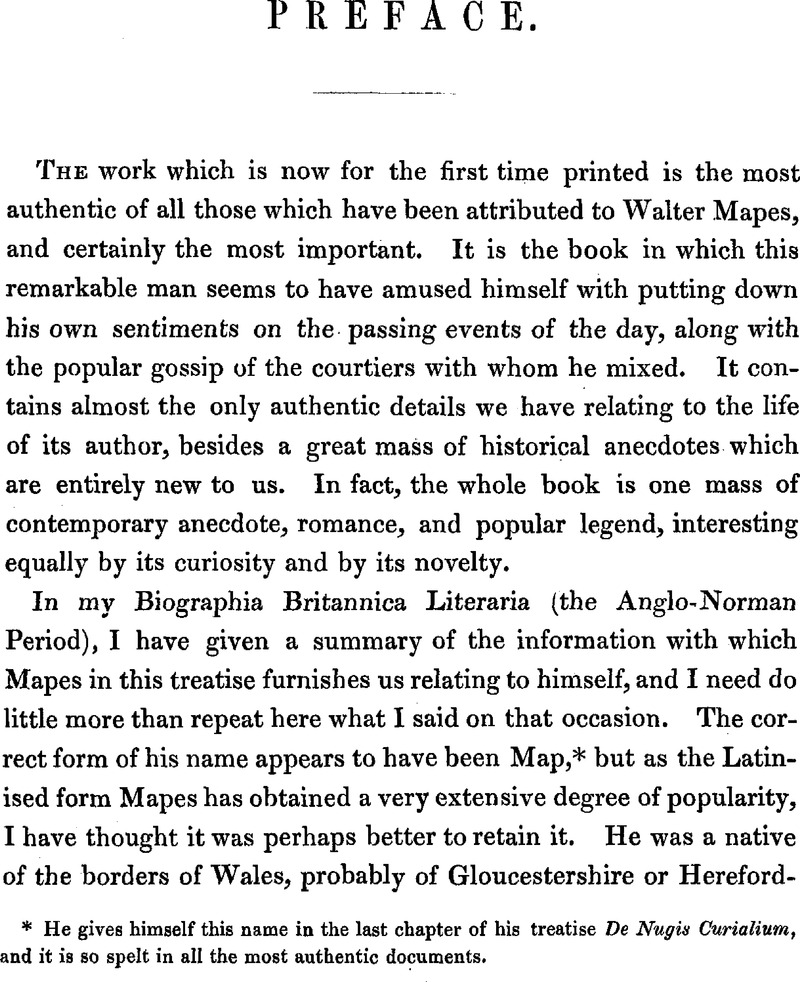No CrossRef data available.

page v note * He gives himself this name in the last chapter of his treatise De Nugis Curialium, and it is so spelt in all the most authentic documents.
page vi note * He terms himself a Marcher (qui marchio sum Walensibus. De Nug. Cur. Distinc. ii. c. 23), and calls the Welshmen his countrymen (compatriotæ nostri, Distinc. ii. c. 20). He tells so many Herefordshire legends in this book, that we may be led to suppose him of that county. He calls England mater nostra, Distinc. iv. c. 1.
page vi note † De Nug. Cur. Distinc. v. c. 6.
page vi note ‡ De Nug. Cur. Distinc. v. c. 5.
page vi note § De Nug. Cur. Distinc. ii. c. 7. Vidi Parisius Lucam Hungarum in schola magistri Girardi Puellæ.
page vi note ∥ De Nug. Cur. ii. 23.
page vi note ¶ Madox, Hist. Excheq. vol. i. p. 701, from the Mag. Rot. 19 Hen. II. Giraldus Cambrensis informs us that Mapes frequently acted with the judges itinerant.
page vi note ** De Nug. Curial. Distinc. ii. c. 3.
page vi note †† De Nug. Cur. Distiuc. iv. c. 1.
page vii note * De Nug. Cur. Distinc. v. c. 5.
page vii note † The account of his interview with the Waldenses is given in this book De Nug. Cur. Distinc. i. c. 31.
page vii note ‡ De Nug. Cur. Distinc. v. c. 6.
page vii note § In a charter of Ralph de Diceto, given in Tanner, Mapes is described as Lincolniensis ecclesiæ præcentor et noster concanonicus.
page vii note ∥ Giraldus Cambrensis, Spec. Eccles. in the Appendix to the Introduction to the Latin Poems commonly attributed to Walter Mapes, pp. xxxi. and xxxiv.
page viii note * De Nug. Cur. Distinc. iv. c. 1.
page viii note † Ibid. v. c. 6.
page viii note ‡ De cantore Lincolnieusi Waltero Map in Oxenefordensem archidiaconum translatione facta. Rad. de Dicet. col. 695, Conf. Joh. Bromton, Chron. col. 1271.
page viii note § Conf. De Nug. Curial. Distinc. i. c. 10, Distinc. iv. c. 2, and Distinc. v. c. 1
page viii note ∥ De Nug. Curial. Distinc. i. c. 24.
page ix note * De Nug. Curial. Distinc. ii. cc. 2 to 5.
page ix note † MS. Bodley, No. 851.
page ix note ‡ Distinc. iv. c. 2.